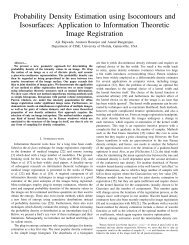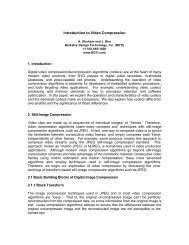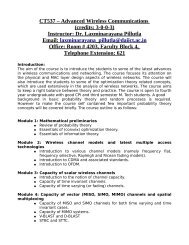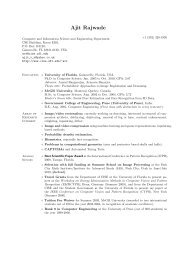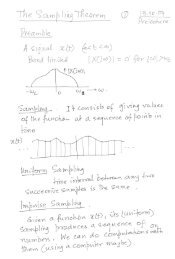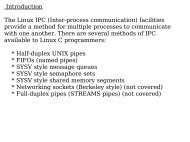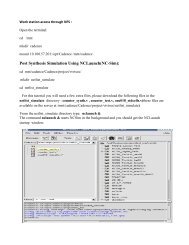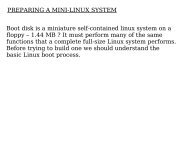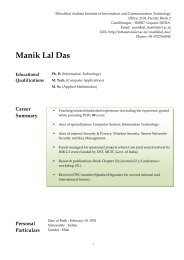Introduction - DAIICT Intranet
Introduction - DAIICT Intranet
Introduction - DAIICT Intranet
Create successful ePaper yourself
Turn your PDF publications into a flip-book with our unique Google optimized e-Paper software.
<strong>Introduction</strong><br />
Threads are often called lightweight processes.<br />
Threads are cousins to UNIX processes though they are not<br />
processes themselves<br />
In UNIX, a process contains both an executing program and a<br />
bundle of resources such as the file descriptor table and<br />
address space.<br />
All threads associated with a given task share the task's<br />
resources. Thus a thread is essentially a program counter, a<br />
stack, and a set of registers -- all the other data structures<br />
belong to the task.<br />
Since threads are very small compared with processes, thread<br />
creation is relatively cheap in terms of CPU costs.<br />
As processes require their own resource bundle, and threads<br />
share resources, threads are likewise memory frugal.
Hello World<br />
The pthread_create function creates a new thread. It takes<br />
four arguments, a thread variable or holder for the thread, a<br />
thread attribute, the function for the thread to call when it<br />
starts execution, and an argument to the function.<br />
For example:<br />
pthread_t a_thread;<br />
pthread_attr_t a_thread_attribute;<br />
void thread_function(void *argument);<br />
char *some_argument;<br />
pthread_create( &a_thread, a_thread_attribute,<br />
(void *)&thread_function, (void *) &some_argument);
A thread attribute currently only specifies the minimum stack<br />
size to be used.<br />
Most applications can get by simply using the default by<br />
passing pthread_attr_default in the thread attribute<br />
parameter position.<br />
Unlike processes created by the UNIX fork function that begin<br />
execution at the same point as their parents, threads begin<br />
their execution at the function specified in pthread_create.<br />
The reason for this is clear; if threads did not start execution<br />
elsewhere we would have multiple threads executing the same<br />
instructions with the same resources.<br />
Recall that processes each have their own resource bundle<br />
and threads share theirs.
Now that we know how to create threads we are ready for our<br />
first application.<br />
Lets design a multi-threaded application that prints “a” and<br />
“b” on stdout.<br />
First we need two thread variables and we need a function for<br />
the new threads to call when they start execution.<br />
We also need some way to specify that each thread should<br />
print a different message.<br />
One approach is to partition the words into separate<br />
character and to give each thread a different string as its<br />
"startup" parameter.
* Creates two threads, one printing 10000 "a"s, the other<br />
printing 10000 "b"s.<br />
Illustrates: thread creation, thread joining. */<br />
#include <br />
#include <br />
#include <br />
#include "pthread.h"<br />
static void *<br />
process (void *arg)<br />
{<br />
int i;<br />
fprintf (stderr, "Starting process %s\n", (char *) arg);<br />
for (i = 0; i < 100000; i++)<br />
{<br />
write (1, (char *) arg, 1);<br />
}<br />
return NULL;<br />
}
int<br />
main (void)<br />
{<br />
int retcode;<br />
pthread_t th_a, th_b;<br />
void *retval;<br />
retcode = pthread_create (&th_a, NULL, process, (void *) "a");<br />
if (retcode != 0)<br />
fprintf (stderr, "create a failed %d\n", retcode);<br />
retcode = pthread_create (&th_b, NULL, process, (void *) "b");<br />
if (retcode != 0)<br />
fprintf (stderr, "create b failed %d\n", retcode);<br />
retcode = pthread_join (th_a, &retval);<br />
if (retcode != 0)<br />
fprintf (stderr, "join a failed %d\n", retcode);<br />
retcode = pthread_join (th_b, &retval);<br />
if (retcode != 0)<br />
fprintf (stderr, "join b failed %d\n", retcode);<br />
return 0;<br />
}
Thread Synchronization<br />
POSIX provides two thread synchronization primitives, the<br />
mutex and the condition variable.<br />
Mutexes are simple lock primitives that can be used to<br />
control access to a shared resource.<br />
Note that with threads, the entire address space is shared so<br />
everything can be considered a shared resource.<br />
However, in most cases threads work individually with<br />
(conceptually) private local variables, those created within<br />
the function called by pthread_create and successive<br />
functions, and combine their efforts through global<br />
variables. Access to the commonly written items must be<br />
controlled.



